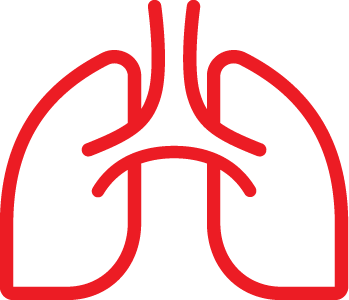
The need to reduce disease progression and metastases in EGFR+ NSCLC
Most patients will experience progression1–9
Multiple clinical trials have demonstrated improvement in PFS with first- and second-generation EGFR TKIs compared to standard chemotherapy.1,2
A subsequent meta-analysis confirmed that, compared with chemotherapy, EGFR TKIs are associated with a 63% reduction in the risk of disease progression or death.3
Despite treatment with first- and second-generation EGFR TKIs, the majority of patients will experience disease progression after approximately 12 months.4-6
Acquired resistance following first-generation EGFR TKI therapy increases the risk of tumor progression and brain metastases later in the course of NSCLC:6,7

59.5%
of patients present with a lung metastasis at diagnosis7
![]()
24%
of patients have brain metastases at diagnosis7
39%
of patients develop brain metastases during the course of disease7
The role of EGFR exon 20 mutations in progression and metastases6,8,9
There are over 64 unique variants of exon 20 insertion mutations, which comprise about 10% of all EGFR mutants in NSCLC.8 Most exon 20 mutations are EGFR TKI-resistant.8
In patients with exon 20 mutations receiving first- or second-generation EGFR TKIs, ORRs are limited to 0–11% and median PFS to only 2–3 months.8 The most frequent mechanism of resistance is the development of a second exon 20 T790M substitution mutation, which occurs in up to 60% of patients following first-generation EGFR TKI therapy.6
For patients with exon 20 mutations receiving third-generation EGFR TKI therapy, ORR was 5%, median PFS was 3.6 months and median OS was 8.7 months.9
Most pivotal studies with EGFR TKIs have included patients with common (or classic) EGFR mutations, such as exon 19 or 21 mutations.8 There are no approved EGFR TKIs that are specifically designed to target uncommon EGFR mutations, such as the exon 20 insertion mutation.9
Novel targeted EGFR TKI therapy is needed to overcome acquired resistance, delay disease progression and extend OS in patients with advanced NSCLC6
LEARN ABOUT SENSITIZING MUTATIONS
EGFR(+): epidermal growth factor receptor (positive); NSCLC: non-small-cell lung cancer; ORR: overall response rate; OS: overall survival; PFS: progression- free survival; TKI: tyrosine kinase inhibitor.
1. Karachaliou N, et al. EGFR first- and second-generation TKIs—there is still place for them in EGFR-mutant NSCLC patients. Transl Cancer Res. 2019;8:S23–S47.
2. Takeda M, Kazuhiko Nakagawa. First- and second-generation EGFR-TKIs are all replaced to osimertinib in chemo-naive EGFR mutation-positive non-small cell lung cancer? Int J Mol Sci. 2019;20:146.
3. Lee C, et al. Impact of specific Epidermal Growth Factor Receptor (EGFR) mutations and clinical characteristics on outcomes after treatment with EGFR tyrosine kinase inhibitors versus chemotherapy in EGFR-mutant lung cancer: a meta-analysis. J Clin Oncol. 2015;33:1958–65.
4. Sequist LV, et al. Genotypic and histological evolution of lung cancers acquiring resistance to EGFR inhibitors. Sci Transl Med. 2011;3:75ra26.
5. Yu HA, et al. Analysis of tumor specimens at the time of acquired resistance to EGFR-TKI therapy in 155 patients with EGFR-mutant lung cancers. Clin Cancer Res. 2013;19:2240–7.
6. Yoneda K, et al. Treatment of non-small cell lung cancer with EGFR-mutations. J UOEH. 2019;41:153–163.
7. Hsu F, et al. Patterns of spread and prognostic implications of lung cancer metastasis in an era of driver mutations. Curr Oncol. 2017;24:228–33.
8. Russo A, et al. Heterogeneous responses to Epidermal Growth Factor Receptor (EGFR) Tyrosine Kinase Inhibitors (TKIs) in patients with uncommon EGFR mutations: new insights and future perspectives in this complex clinical scenario. Int J Mol Sci. 2019;20:1431.
9. Van Veggel B, et al. Osimertinib treatment for patients with EGFR exon 20 mutation positive non-small cell lung cancer. Lung Cancer. 2020;141:9–13.
